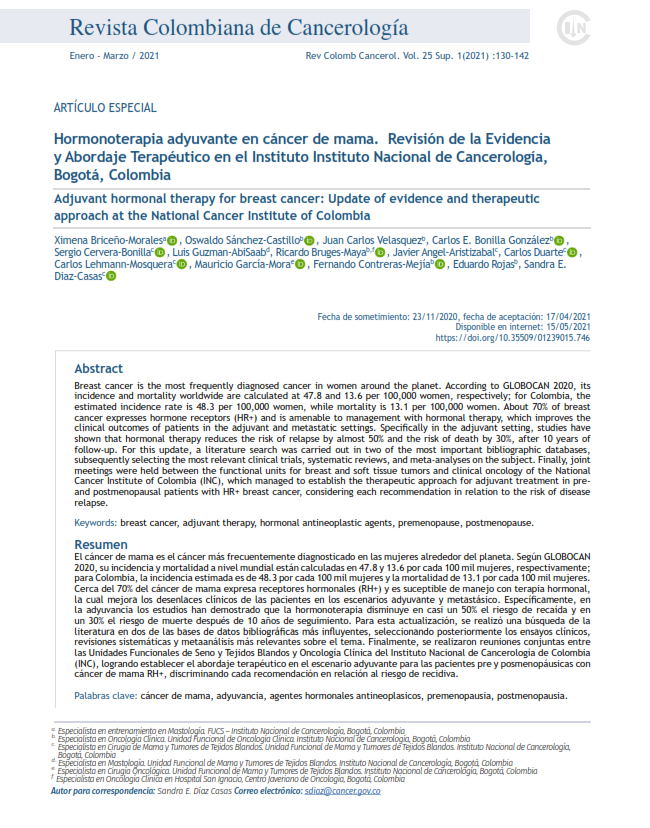Adjuvant hormonal therapy for breast cancer: Update of evidence and therapeutic approach at the National Cancer Institute of Colombia
DOI:
https://doi.org/10.35509/01239015.746Keywords:
breast cancer, adjuvant therapy, hormonal antineoplastic agents, premenopause, postmenopauseAbstract
Breast cancer is the most frequently diagnosed cancer in women around the planet. According to GLOBOCAN 2020, its incidence and mortality worldwide are calculated at 47.8 and 13.6 per 100,000 women, respectively; for Colombia, the estimated incidence rate is 48.3 per 100,000 women, while mortality is 13.1 per 100,000 women. About 70% of breast cancer expresses hormone receptors (HR+) and is amenable to management with hormonal therapy, which improves the clinical outcomes of patients in the adjuvant and metastatic settings. Specifically in the adjuvant setting, studies have shown that hormonal therapy reduces the risk of relapse by almost 50% and the risk of death by 30%, after 10 years of follow-up. For this update, a literature search was carried out in two of the most important bibliographic databases, subsequently selecting the most relevant clinical trials, systematic reviews, and meta-analyses on the subject. Finally, joint meetings were held between the functional units for breast and soft tissue tumors and clinical oncology of the National Cancer Institute of Colombia (INC), which managed to establish the therapeutic approach for adjuvant treatment in pre-and postmenopausal patients with HR+ breast cancer, considering each recommendation in relation to the risk of disease relapse.
References
Waks AG, Winer EP. Breast Cancer Treatment: A Review. JAMA. 2019 Jan 22;321(3):288-300. doi: 10.1001/jama.2018.19323.PMID: 30667505. https://doi.org/10.1001/jama.2018.19323
Guía de Práctica Clínica (GPC) para la detección temprana, tratamiento integral, seguimiento y rehabilitación de pacientes con cáncer de mama. Sistema de Seguridad Social, Colombia, 2013. Guía No. 19.
Pan H, Gray R, Braybrooke J, et al. 20-Year Risks of BreastCancer Recurrence after Stopping Endocrine Therapy at 5 Years. N Engl J Med 2017; 377:1836-1846. https://doi.org/10.1056/NEJMoa1701830
Goldvaser H, Barnes TA, Šeruga B, et al. Toxicity of Extended Adjuvant Therapy With Aromatase Inhibitors in Early Breast Cancer: A Systematic Review and Meta-analysis. JNCI: Journal of the National Cancer Institute, Volume 110, Issue 1, January 2018, Pages 31–39. https://doi.org/10.1093/jnci/djx141
Early Breast Cancer Trialists’ Collaborative Group (EBCTCG). Tamoxifen for early breast cancer: an overview of the randomised trials. Lancet 1998; 351: 1451–67.
Early Breast Cancer Trialists’ Collaborative Group (EBCTCG). Relevance of breast cancer hormone receptors and other factors to the efficacy of adjuvant tamoxifen: patient-level meta-analysis of randomised trials. Lancet 2011; 378: 771–84. https://doi.org/10.1016/S0140-6736(11)60993-8
Davies C, Pan H, Godwin J, et al. Long-term effects of continuing adjuvant tamoxifen to 10 years versus stopping at 5 years after diagnosis of oestrogen receptor-positive breast cancer: ATLAS, a randomised trial. Lancet 2013; 381: 805–16. https://doi.org/10.1016/S0140-6736(12)61963-1
Gray R, Rea D, Handley K, et al. aTTom: long-term effects of continuing adjuvant tamoxifen to 10 years versus stopping at 5 years in 6934 women with early breast cancer. J Clin Oncol 2013; 31 (suppl): abstr 5.
M P.A. Francis, O. Pagani, G.F. Fleming, B.A, et al. Tailoring Adjuvant Endocrine Therapy for Premenopausal Breast Cancer. N Engl J Med; June 4, 2018, at NEJM.org. https://doi.org/10.1056/NEJMoa1803164
Early Breast Cancer Trialists’ Collaborative Group (EBCTCG). Aromatase inhibitors versus tamoxifen in early breast cancer: patient-level meta-analysis of the randomised trials. Lancet 2015; 386: 1341–52. https://doi.org/10.1016/S01406736(15)61074-1
Benson J, Jatoi I. Extended endocrine therapy in early breast cancer: how long and who for?. Future Oncol. (2019) 16(1), 4327–4336. https://doi.org/10.2217/fon-2019-0254
Goss F, Ingle J, Martino S et al. Randomized trial of letrozole in post-menopausal women after 5 years of tamoxifen therapy for early stage breast cancer. N. Eng. J. Med. 349, 1793–1802 (2003). https://doi.org/10.1056/NEJMoa032312
Goss P, Mamounas E, Jakesz R et al. Aromatase inhibitors versus not (placebo/observation) as late extended adjuvant therapy for postmenopausal women with early stage breast cancer: overviews of randomized trials of aromatase inhibitors after approximately 5 years of tamoxifen. Cancer Res. 69, 4081 (2009).
Goss PE, Ingle JN, Pritchard KI et al. Extending aromatase inhibitor adjuvant therapy to 10 years. N Engl J Med 375, 209–219 (2016). https://doi.org/ 10.1056/NEJMoa1604700
Jakesz R, Greil R, Gnant M, et al. Extended Adjuvant Therapy With Anastrozole Among Postmenopausal Breast Cancer Patients: Results From the Randomized Austrian Breast and Colorectal Cancer Study Group Trial 6a. J Natl Cancer Inst 2007;99:1845–53. https://doi.org/10.1093/jnci/djm246.
Mamounas E, Jeong JH, Wickerham DL. Benefit From Exemestane As Extended Adjuvant Therapy After 5 Years of Adjuvant Tamoxifen: Intention-to-Treat Analysis of the National Surgical Adjuvant Breast and Bowel Project B-33 Trial. J Clin Oncol 2008, 26:1965-1971. https://doi.org/10.1200/JCO.2007.14.0228.
Blok E, Kroep JR, Meershoek-Klein Kranenbarg E et al. Optimal duration of extended adjuvant endocrine therapy for early breast cancer: results of the IDEAL trial (BOOG 2006-05). J. Natl Cancer Inst. 110 (1) https://doi.org/10.1093/jnci/djx134
Tjan-Heijnen VCG, van Hellemond IEG, Peer PGM et al. Extended adjuvant aromatase inhibition after sequential endocrine therapy (DATA): a randomized Phase III trial. Lancet Oncol. 18(11), 1502–1511 (2017). https://doi.org/10.1016/ S1470-2045(17)30600-9
Mamounas E, Bandos H, Lembersky B et al. Use of letrozole after aromatase inhibitor-based therapy in post-menopausal breast cancer (NRG Oncology/NSABP B-42): a randomized, double blind placebo-controlled, Phase III trial. Lancet 20(1), 88–99 (2019). https://doi.org/10.1016/S1470-2045(18)30621-1
Gnant M, Steger G, Greil R et al. A prospective randomized multicentre Phase-III trial of additional 2 versus additional 5 years of anastrozole after initial 5 years of adjuvant endocrine therapy – results from 3,484 post-menopausal women in the ABSCSG-16 trial. San Antonio Breast Cancer Symposium, San Antonio, TX, USA, 7 December 2017.
Ohtani S, Iijima K, Higaki K et al. A prospective randomized multicenter open-label Phase III trial of extending aromatase inhibitor therapy to 10 years: results from 1,697 postmenopausal women in the N-SA BC05 trial: arimidex extended adjuvant randomized study (AERAS). San Antonio Breast Cancer Symposium San Antonio, TX, USA, 4–8 December 2018.
Del Mastro L, Mansutti M, Bisagni G, Ponzone R, Durando A, Amadducci L. Benefit from letrozole as extended adjuvant therapy after sequential endocrine therapy: a randomized Phase III study of Gruppo Italiano Mammella (GIM). J. Clin. Oncol. 37(Suppl. 1), Abstr 504 (2019).
Duffy SW, Vulkan D, Cuckle H, et al. Extended adjuvant intermittent letrozole versus continuous letrozole in postmenopausal women with breast cancer (SOLE): a multicentre, open-label, randomised, phase 3 trial. www.thelancet.com/oncology Published on line, November 17, 2017. https://doi.org/10.1016/S1470-2045(17)30715-5
Finn RS, Martin M, Rugo HS, Jones S, Im SA, Gelmon K, et al. Palbociclib and letrozole in advanced breast cancer. N Engl J Med. 2016;375(20):1925–36. https://doi.org/10.1056/NEJMoa1607303
Hortobagyi GN, Stemmer SM, Burris HA, Yap YS, Sonke GS, PaluchShimon S, et al. Ribociclib as first-line therapy for HR-positive, advanced breast cancer. N Engl J Med. 2016;375(18):1738–48. https://doi.org/10.1056/NEJMoa1609709
Goetz MP, Toi M, Campone M, Trédan O, Bourayou N, Sohn J, et al. MONARCH 3: Abemaciclib as initial therapy for advanced breast cancer. J Clin Oncol. 2017;35(32):3638–46. https://doi.org/10.1200/JCO.2017.75.6155
Tripathy D, Im SA, Colleoni M, Franke F, Bardia A, Harbeck N, et al. Ribociclib plus endocrine therapy for premenopausal women with hormone-receptor-positive, advanced breast cancer (MONALEESA-7): a randomised phase 3 trial. Lancet Oncol [Internet]. 2018;19(7):904–15. Available from: http://dx.doi.org/10.1016/S1470-2045(18)30292-4.
Im SA, Lu YS, Bardia A, Harbeck N, Colleoni M, Franke F, et al. Overall survival with ribociclib plus endocrine therapy in breast cancer. N Engl J Med. 2019;381(4):307–16. https://doi.org/10.1056/NEJMoa1903765
Turner NC, Slamon DJ, Ro J, Bondarenko I, Im SA, Masuda N, et al. Overall survival with palbociclib and fulvestrant in advanced breast cancer. N Engl J Med. 2018;379(20):1926–36. https://doi.org/10.1056/NEJMoa1810527
Slamon DJ, Neven P, Chia S, Fasching PA, De Laurentiis M, Im SA, et al. Overall survival with ribociclib plus fulvestrant in advanced breast cancer. N Engl J Med. 2020;382(6):514–24.
https://doi.org/10.1056/NEJMoa1911149
Sledge GW, Toi M, Neven P, Sohn J, Inoue K, Pivot X, et al. The Effect of Abemaciclib Plus Fulvestrant on Overall Survival in Hormone Receptor-Positive, ERBB2-Negative Breast Cancer That Progressed on Endocrine Therapy - MONARCH 2: A Randomized Clinical Trial. JAMA Oncol. 2020;6(1):116–24. https://doi.org/10.1001/jamaoncol.2019.4782
Johnston Stephen R. D, Harbeck Nadia, Hegg T Roberto, et al. Abemaciclib Combined With Endocrine Therapy for the Adjuvant Treatment of HR+, HER2-, Node-Positive, High-Risk, Early Breast Cancer (monarchE). scopubs.org/journal/ jco on September 20, 2020: DOI https://doi. org/10.1200/JCO.20. 02514. https://doi.org/10.1200/JCO.20.02514
Mayer EL, Gnant MI, DeMichele A, et al. PALLAS: A randomized phase trial of adjuvant palbociclb with endocrine therapy vs andocrine therapy alone for HR+/HER2 early breast cancer. ESMO Virtual Congress 2020. Abstract LBA 12. Presented September 20, 2020.
Slamon DJ, et al. NATALEE: Phase III study of ribociclib (RIBO) + endocrine therapy (ET) as adjuvant treatment in hormone receptor–positive (HR+), human epidermal growth factor receptor 2–negative (HER2–) early breast cancer (EBC). May 2019. Journal of Clinical Oncology 37(15_suppl):TPS597TPS597. DOI:10.1200/JCO.2019.37.15_suppl.TPS597.
Von Minckwitz G, et at. Abstract OT2-6-11: PENELOPE: Phase III study evaluating palbociclib (PD-0332991), a cyclin-dependent kinase (CDK) 4/6 inhibitor in patients with hormone-receptorpositive, HER2-normal primary breast cancer with high relapse risk after neoadjuvant chemotherapy (GBG-78/BIG1-13). Cancer Res 2013;73(24 Suppl): Abstract nr OT2-6-11.
Díaz-Casas SE, Castilla-Tarra JA, Pena-Torres E, et al. Pathological Response to Neoadjuvant Chemotherapy and the Molecular Classification of Locally Advanced Breast Cancer in a Latin American Cohort. The Oncologist 2019;24:1–11. https://doi.org/10.1634/theoncologist.2019-0300
How to Cite
Downloads

Downloads
Published
Issue
Section
License
Todos los derechos reservados.




